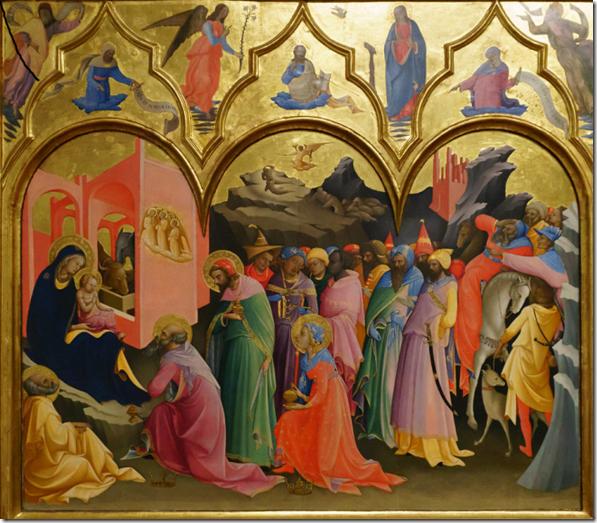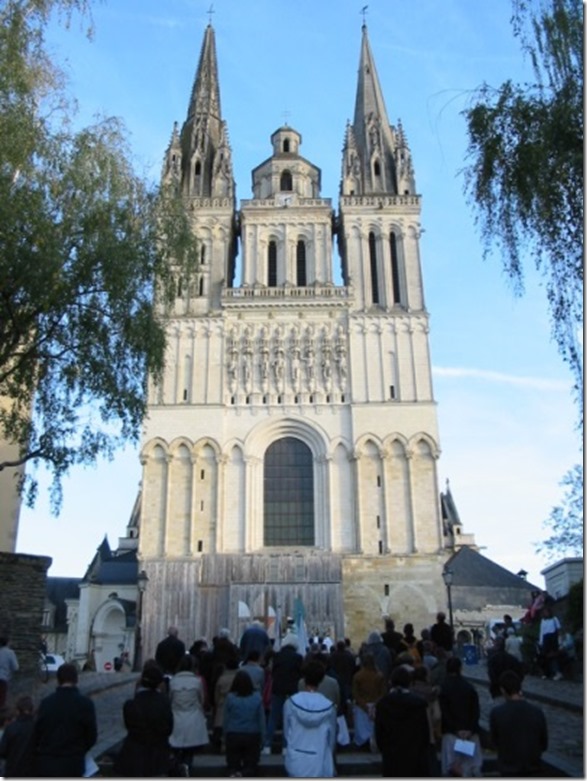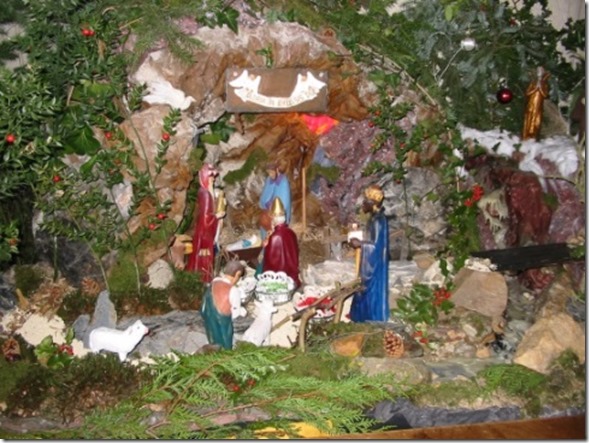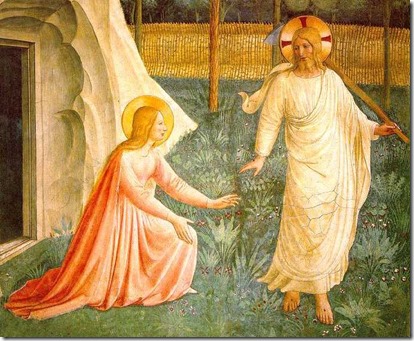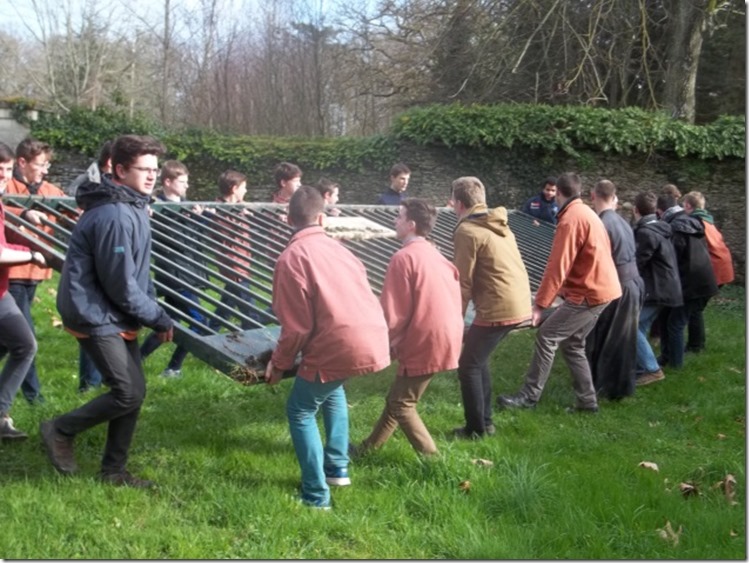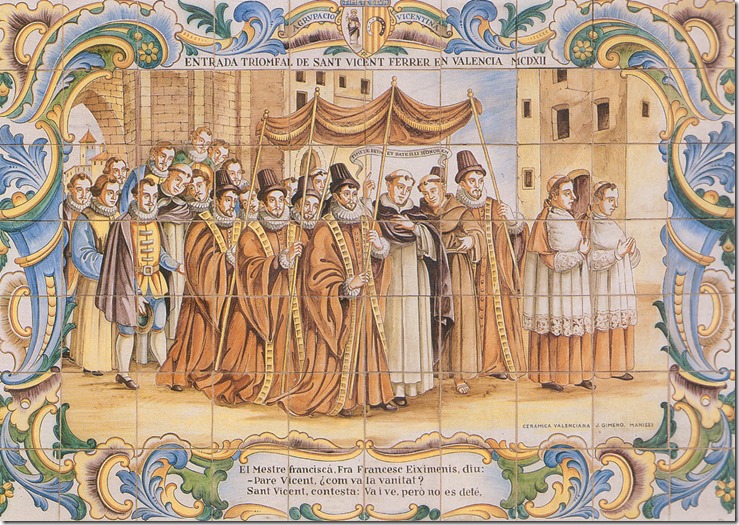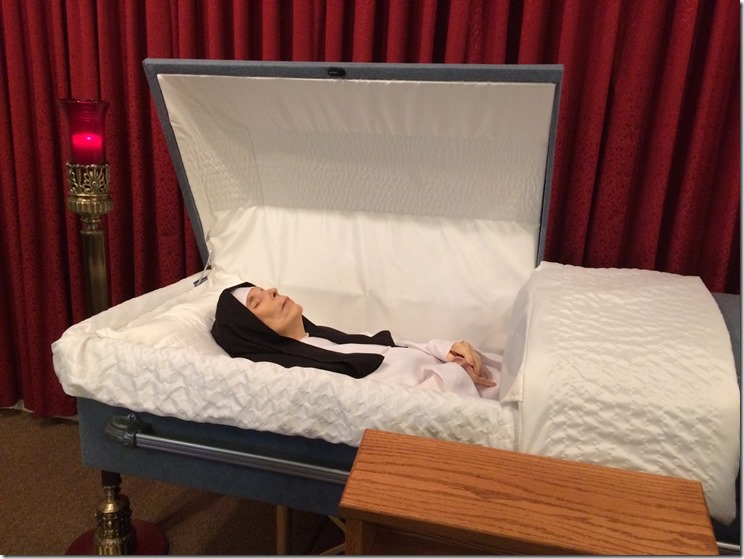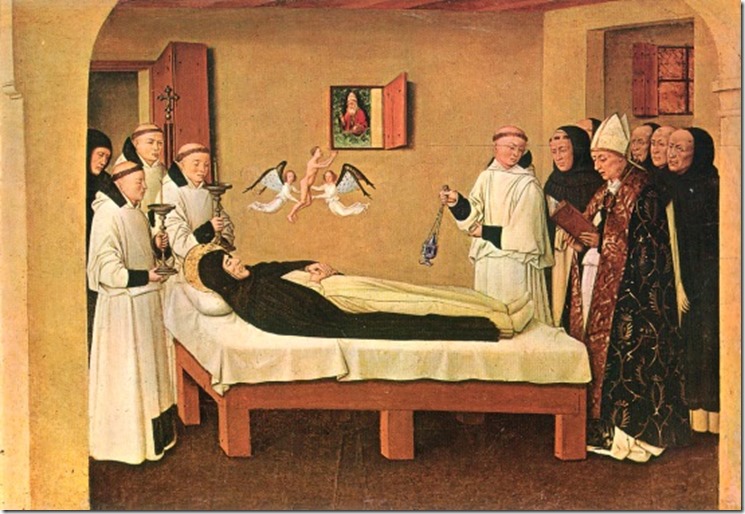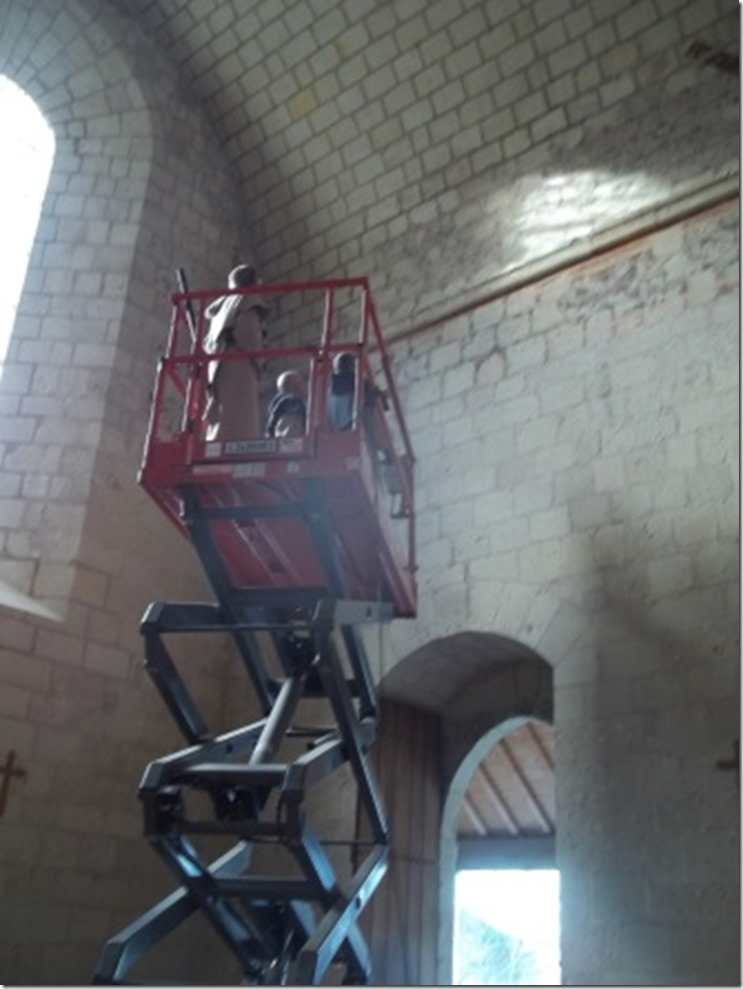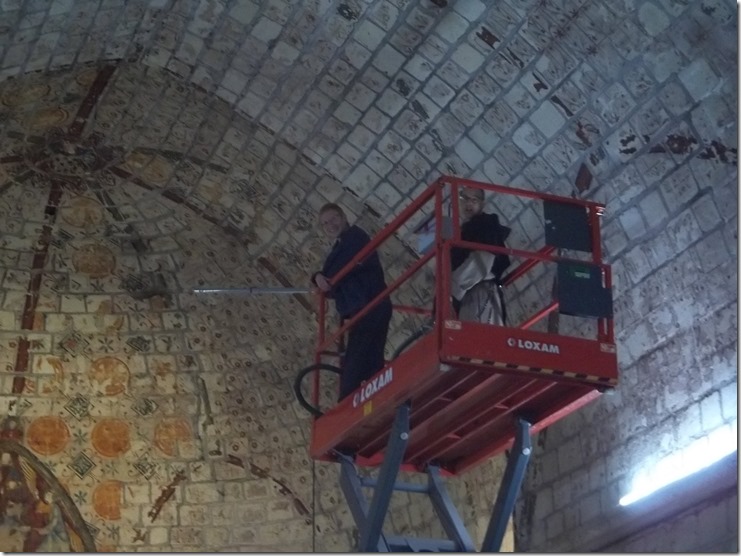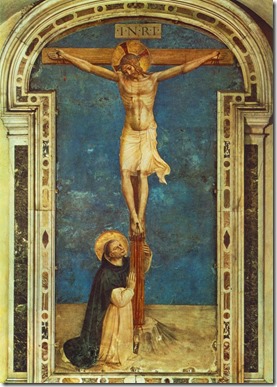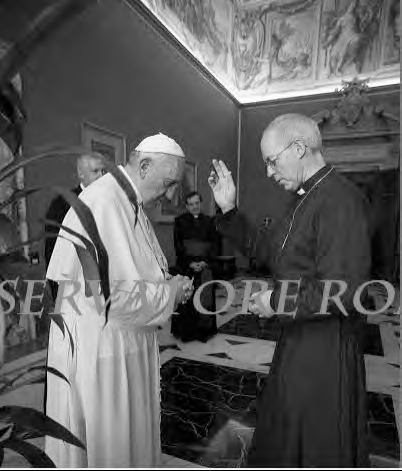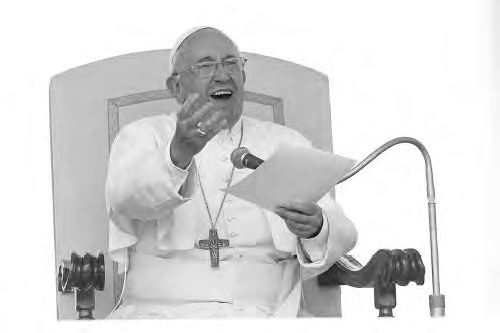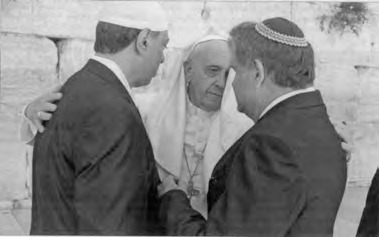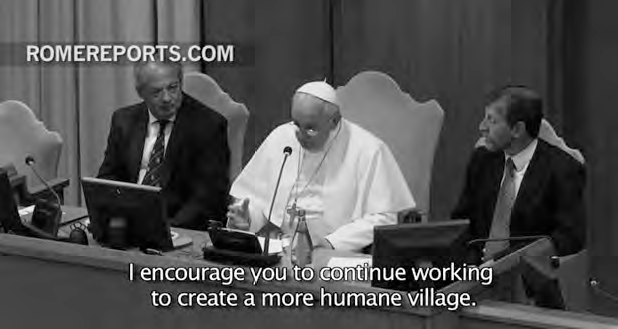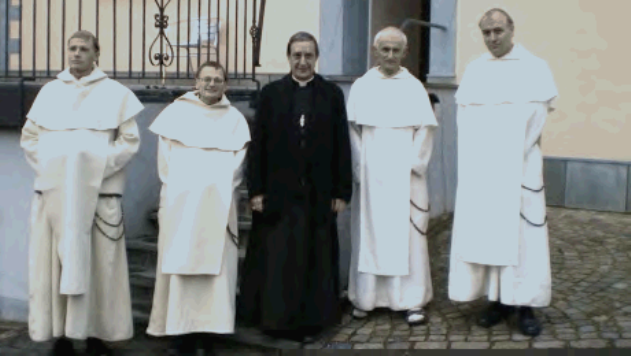Letter from the Dominicans of Avrillé
Adoration by the Magi (Lorenzo Monaco, 1421-1422).
No. 37: January 2022
O Great Mystery
Joy is one of the most striking sentiments of the liturgy for the mystery of the Nativity. The Church invites us constantly to be joyful recalling the words of the Angel to the shepherds “To you I announce good news which will be for you the source of great joy: a Savior is born”. (St. Luke 2: 10-11). The joy of Christmas is one of deliverance, of a conquered heritage, of peace, and especially of the vision of God given to men. “And he will be called Emmanuel”. (Isaiah 7: 14; St. Matthew 1: 23)
But this joy will only be assured if we remain faithful to the grace given to us by the Savior and which makes us His brothers. “O, Christian,” says St. Leo the Great in his sermon that the Church reads during the Holy night, “recognize your dignity. And participating in the Divinity, be careful not to fall from such a sublime state.”
“If you knew the gift of God” (St. John 4, 10), said Our Lord. If you knew this Son who is given to you! Let us receive Him as we should. May it not be said of us: “He came into the world and His own received Him not.” (Christmas Gospel) By creation we are all in the domain of God, we belong to Him; but there are those who have not received Him on this Earth. How many Jews and pagans have rejected Our Lord because He appeared in humility and corruptible flesh! Souls drowned in the darkness of pride and sensuality: “The light shown in the darkness and the darkness received it not.” (Last Gospel)
And how must we receive it? By Faith – those who “believe in His Name”. It is to those who believing in Him, in his words and works, have received this Child as God that it has been given in return to become themselves children of God.
Such is, indeed, the fundamental disposition that we must have in order that this great mystery (antiphon of the Octave of Christmas) produces in us all its fruits. Only by Faith may we know the terms and the manner in which it is realized. May we penetrate into the depths of this mystery and have a true knowledge worthy of God.
There are different modes and degrees of knowledge.
“The ox and ass knew their God,” (Isaiah 1: 3) was written by Isaiah speaking of this mystery. They saw the Child lying in the manger. But what did they see? That which an animal can see: the form, the size the color, the movement- rudimentary knowledge which does not leave the realm of sensation. Nothing more.
The passers-by, the curious who came to the stable saw the Child; but for them, He seemed to be like all others. They did not go further than this purely natural knowledge. Perhaps they were struck by the beauty of the Child? Perhaps they were saddened by His destitution? But this sentiment did not last, and indifference took over quickly.
The shepherds, simple souls, “enlightened by a ray of light from on high” (St. Luke 2: 9) certainly understood more; they recognized in this Child the promised Messiah, the expectation of the Gentiles. (Genesis 49: 10) they gave Him homage and their souls were for a long time filled with joy and peace.
The angels also contemplated the New – Born, the Word made flesh. They saw in Him their God. This knowledge cast these pure spirits into stupor and admiration at such a debasement, impossible to understand. It is not the Angelic nature that He wanted to take, but the human nature. “For nowhere doth He taketh hold of the angels: but of the seed of Abraham he taketh hold.” (Hebrews 2: 16)
What would we say of the Blessed Virgin Mary when she saw Jesus? To what depth of this mystery did this regard so pure, humble and tender, full of kindness penetrate! We would not be able to be express with what graces the soul of Our Lord filled His Mother and what sublime adorations, what perfect homages Mary gave to Her Child, to Her God, and to all that of which the Incarnation is the substance and root.
There is finally, and this is undeniable, the regard of the Father contemplating His Son, made flesh for men. The Heavenly Father saw that which never, neither man nor angel nor Mary herself, will ever understand: the infinite perfections of the Divinity which are hidden in a Child. And this contemplation was the source of unspeakable glory, “Thou art by beloved Son. In Thee I am well pleased.” (St. Matthew 1: 11; St. Luke 3: 22)
When we contemplate at Bethlehem the Word made flesh, let us lift ourselves above our senses, and only look with our eyes of Faith. The Faith allows us to participate here below in the knowledge that the divine Persons have of one another. There is no exaggeration in this. Sanctifying Grace makes us indeed, participants of the Divine Nature. And the activity of the Divine Nature consists in the knowledge and love that the Divine Persons have for one another. So, we participate in this knowledge. And even as sanctifying grace opening itself into glory will give us the right to contemplate God as He sees Himself; so on Earth, in the shadows of Faith, grace gives us the possibility to look into the depths of these mysteries through the eyes of God. “A new ray of your greatness has shown in the eyes of our souls” (Preface of Christmas)
Extract of Dom Marmion,
Christ in His Mysteries
Community Chronicle
September 26th: In the beginning of the new school year a parish pick-nick allows our faithful to deepen the bonds of charity among each other and have an afternoon to speak with different Fathers of the community.
October 2nd: As history has proved, during times of great distress it is necessary to pray fervently, especially the rosary. On our little scale, as the world wide situation continues to go downhill, we try and help others to invoke our Lady. During this month October we organize a public Rosary in front of the cathedral every Saturday afternoon.
Public Rosary in front of the cathedral.
November 14th: Better late than never! After about a two month’s delay we are at last able to start our different conferences for the formation of our faithful on such topics as catechism, philosophy and education.
November 16th: We sing a Requiem Mass for the repose of the soul of Father Xavier Ignatius, Indian priest and Dominican tertiary. He passed away after 70 years of priesthood and shortly before his 100th birthday. During many years he travelled all around the South of India in order to spread the Rosary Confraternity and support our tertiaries. One of our priests was able to visit him in 2004.
November 21st: Thanks to the generous help of many faithful, the annual winter market is the occasion to help finance our grade school and gather our parishioners for a pleasant afternoon.
December 8th: Once again this year we cannot do the procession through the streets of Angers because of the governmental restrictions. But we organize the Rosary in front of the cathedral in honor of the Immaculate Conception.
The Nativity scene in our church.
December 22nd-January 5th: During Christmas vacation, with all the activities of our schools ceasing, our community gathers around the crib and the great mystery of the Word made flesh. These moments of greater calm and recollection remind us that Dominicans are contemplatives whose contemplation simply overflows into different forms of apostolate for the salvation of souls.
News from our worksites
We have begun enclosing the woods of our property with a real fence. During the past few months we have also finished up some smaller jobs such as the new school sacristy and a roof for our Lady’s statue in our woods. God willing, we shall shortly be able to start up the worksite of the future parish hall.
Thank you for all your help!
“Amen I say to you, as long as you did it to one of these my least brethren, you did it to me.” (Mt. 25, 40)
Construction of the fence around our woods.
Remember, Oh Most Pious Virgin Mary!
In the face of a spiritual battle, spiritual weapons are needed. […] Human forces alone are unable to face the looming threat. For this we must understand how important and irreplaceable is the use of prayer and divine help, with the invincible weapon that the Blessed Virgin Mary has given us to fight the Enemy of mankind.
I invite everyone to a World Rosary Crusade, to obtain God’s intervention and victory over the unleashing of the forces of Evil through the powerful intercession of the Blessed Virgin.[…]
In all nations, in all cities of the world, may the cry of our prayer be raised confidently and loudly. As children gripped by tribulation we throw ourselves at the feet of our Mother, invoking her with the certainty of obtaining listening. Let us make our own the words of Saint Bernard: Remember, O most pious Virgin Mary, that it has never been heard in the world that some have resorted to your protection, begged for your help, asked for your help, and been forsaken.
Let us kneel to pray in our homes, churches, streets and squares of our cities. In recognizing that we are all in need of the help of the Virgin of the Holy Rosary, we honor the divine order against the infernal chaos, placing all our hope in her who at the foot of the Cross was given to us as Mother, and who as Mother loves and helps us, as it always has done throughout history.
May even the little ones accompany us in this Crusade, whose innocence moves Heaven. May the elderly and the sick also be spiritually united with us, offering their sufferings in union with the Passion of Our Lord Jesus Christ. The devil is terrified by the prayer of children and the penance of those who suffer, because in purity and sacrifice he sees the image of Christ, who has defeated him.
May our heartfelt prayer resound everywhere. We ask the Mediatrix of all Graces to put an end to this destruction of our world, of our freedom, of our identity, of our affections. We ask you to open our eyes, so as not to be pushed into the abyss of despair, hatred, social conflict, pandering to those who sow division in order to hit us in body and soul. […] We ask you to convert the Shepherds, to whom the Lord has entrusted his flock and to whom he will ask for an account of every soul. And for this to happen, we implore the forgiveness of our sins and the public sins of the Nations, since only with repentance and the resolve to no longer offend His divine Son can we hope to be heard.
Animated by this trust, I turn to you, O Mother, Virgin of virgins; I come to you, before you I bow down, repentant sinner. Do not, oh Mother of the Word, despise my prayers, but listen to me kindly and hear me.
+ Carlo Maria Viganò, Archbishop
The Epiphany of the Lord
For timely articles and spiritual reading, please go to our website:
To send a donation:
YOU MAY USE PAYPAL (ON OUR WEBSITE), OR SEND TO:
Dominicans of Avrillé, Inc.
P.O. Box 23, Newman Lake, WA. 99025
Please take note that we no longer have our other bank accounts. Please specify when sending donations to the above address whether your donation is in American or Canadian dollars.
For more information :
Couvent de la Haye-aux-Bonshommes
49240 Avrillé, France

